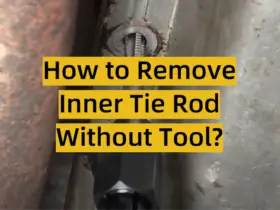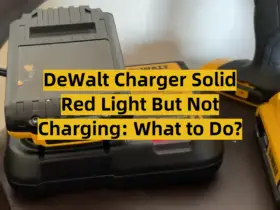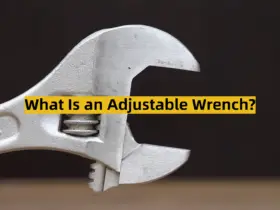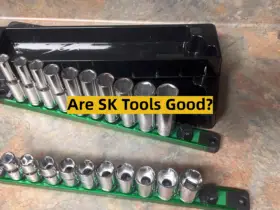Cordless tools have revolutionized the way we work and complete tasks. They offer convenience, flexibility and portability, making them a popular choice among professionals and DIY enthusiasts alike. However, as with any electronic device, cordless tool batteries eventually need to be replaced due to wear and tear.
This can often lead to confusion when it comes to finding the right replacement battery. Fortunately, many cordless tool manufacturers have started using interchangeable batteries, making it easier for users to switch between tools without having to invest in multiple battery types.
How Can You Use Drill Battery Interchange?
Drill battery interchange, also known as battery compatibility, refers to the convenient feature that allows you to use a single battery across a range of cordless tools within the same brand or product line. This means that if you own a drill, circular saw, and even other power tools from the same manufacturer, you can effortlessly swap and share the same battery among them all.

By having this flexibility, you not only save money by not having to purchase separate batteries for each tool, but you also contribute to reducing waste. This efficient battery interchangeability eliminates the need for multiple batteries, reducing the environmental impact caused by their production and disposal.
Why Can’t You Use Direct Interchange?
When it comes to using batteries with your cordless tools, it may appear obvious to use any battery available. However, it is important to understand that a direct interchange is not always feasible or safe. Each cordless tool has unique voltage and amperage requirements, and utilizing a battery with different specifications can potentially result in tool damage or even harm to the user.
Moreover, it is worth noting that using non-compatible batteries can also void the warranty of your cordless tool. To ensure the longevity and safety of your valuable tools, it is absolutely essential to exclusively utilize batteries that are recommended by the manufacturer or those that are specifically designed for the particular tool in question. By adhering to these guidelines, you can safeguard your tools and enjoy optimal performance while avoiding any potential risks. [2]
What You Should Use for Interchanging the Drill Battery?
When it comes to interchangeability, the safest option is to use batteries that are recommended by the tool manufacturer. These batteries have been specifically designed for their respective tools and meet all necessary specifications, ensuring optimal performance and safety.
In addition, some third-party companies also offer compatible battery options for certain cordless tool brands. It is important to do thorough research and make sure these batteries meet the specifications and standards set by the tool manufacturer before purchasing.
Another option is to invest in battery adapters. These devices allow you to use a different brand’s battery with your cordless tool, expanding your options for interchangeability. However, it is important to note that not all brands have compatible adapters available, so it is crucial to do proper research before making a purchase. [2]

Conditions of Battery Compatibility
Power Voltage & Amperage
When considering battery compatibility for cordless tools, it is crucial to pay attention to the power voltage and amperage. Each cordless tool typically has a specific voltage requirement, and using a battery with a higher or lower voltage can potentially cause damage to the motor or circuitry of the tool. Moreover, it is equally important to ensure that the amperage of the battery matches that of the tool to achieve optimal performance. By carefully selecting batteries that meet the voltage and amperage requirements, users can ensure the longevity and efficiency of their cordless tools. [1]
Amperage-Hour (Ah) Rating
Apart from voltage and amperage, the amperage-hour (Ah) rating is another crucial factor to consider for battery compatibility. This rating indicates the capacity of the battery and how long it can power a tool before needing to be recharged. A higher Ah rating typically means longer run time for the tool, making it an important consideration for those who require extended usage. However, it is essential to ensure that the Ah rating of the battery falls within the range recommended by the tool manufacturer for safe and optimal use. [1]
Battery Chemistry
When it comes to battery compatibility, battery chemistry is an important aspect to consider. Cordless tool batteries are available in different chemistries including lithium-ion, nickel-cadmium, and nickel-metal hydride. Each type of battery has its own unique characteristics, such as energy density, memory effect, and self-discharge rate. It’s worth noting that not all cordless tools are compatible with every battery chemistry. Therefore, it is crucial to select a battery with the correct chemistry as recommended by the manufacturer. This ensures both safety and optimal performance of the cordless tool. By understanding the different battery chemistries and their compatibility, users can make informed decisions when choosing the right battery for their specific needs. [1]
Size and Shape Compatibility
Apart from considering the technical specifications, size, and shape compatibility is an important factor to take into account for battery interchangeability. Different cordless tools come with varying battery compartments, each designed to accommodate specific battery sizes and shapes. It is crucial to ensure that the size and shape of the battery align with the specific cordless tool before attempting to use it. This attention to detail not only prevents potential damage to the tool but also prioritizes the safety and well-being of the user. By ensuring proper battery compatibility, users can confidently operate their cordless tools without any concerns of malfunction or compromise in performance. [1]

Capacity Compatibility
When choosing a battery that is compatible with your cordless tools, it is crucial to consider not only the technical and physical aspects but also the battery’s capacity. While it may be tempting to opt for a higher capacity battery, it’s important to note that more capacity doesn’t always translate to better performance for all tools. In fact, using a battery with a higher capacity than recommended can potentially lead to damage or malfunction, depending on the specific requirements of the tool. To ensure safe and optimal usage of your cordless tools, always adhere to the battery capacity recommended by the manufacturer. This will help you avoid any potential issues and ensure the longevity of both the tools and the batteries. [1]
Battery Technology (Li-Ion , Ni-Cd) Interchangeability
Lastly, it’s worth noting that not all battery technologies are interchangeable with one another. For example, lithium-ion batteries cannot be interchanged with nickel-cadmium batteries due to their different voltages and charging requirements. It is important to understand the compatibility limitations among different battery technologies, as using an incompatible battery can potentially damage the tool and pose a safety hazard. Always refer to the manufacturer’s guidelines and recommendations for the specific battery technology that is suitable for your cordless tool. [1]
Drill Machine Requirement
When it comes to cordless drills, there are a few key considerations for battery compatibility. The first is ensuring that the battery voltage matches the voltage requirement of the drill. Additionally, the tool’s Amperage-Hour (Ah) rating should also be taken into account to ensure optimal performance and run time. Another crucial factor to consider is the drill’s weight capacity – some drills may require higher capacity batteries for heavier usage or larger tasks. Lastly, the drill’s chuck size should also be considered when selecting a compatible battery. By taking into account all these requirements and specifications, users can ensure safe and effective use of their cordless drill with interchangeable batteries. [1]
Brand-Specific Compatibility
When considering battery compatibility, it’s worth noting that even among different brands, there can be variations. While some batteries may physically fit and work in a cordless tool from a different brand, it is always recommended to prioritize optimal performance and safety by sticking with the manufacturer’s recommended batteries. Each brand meticulously designs their tools and batteries to meet specific requirements, ensuring the best performance and longevity. Therefore, using interchangeable batteries may not always be the most suitable option. To ensure the utmost compatibility and reliability, it is advisable to use the recommended and compatible batteries specifically designed for your brand of cordless tools. By doing so, you can ensure the seamless operation and longevity of your tools, ultimately enhancing your overall user experience. [3]

Cross-Brand Battery Compatibility
While it is always recommended to use brand-specific batteries, some cordless tools may be compatible with batteries from other brands. This is particularly true for tools that have standardized battery sizes and shapes. However, it’s important to note that this cross-brand compatibility may not always guarantee optimal performance or safety. Different brands may have different voltage requirements or charging methods, which can potentially damage the tool or battery. It’s always best to refer to the manufacturer’s guidelines and recommendations for cross-brand battery compatibility, and only use batteries from other brands if it is deemed safe and suitable. Ultimately, prioritizing safety and optimal performance should be the top priority when considering battery interchangeability between different brands. [3]
The Solution – Cross Brand Battery Adapter
For those who own multiple cordless tools from different brands and want the convenience of interchangeable batteries, there is a solution – cross-brand battery adapters. These adapters allow users to use batteries from one brand in another brand’s tool, thus providing more flexibility and versatility with their cordless tools. However, it’s important to note that not all brands may offer these adapters, and they may come at an additional cost. Additionally, it’s always best to refer to the manufacturer’s guidelines and recommendations before using these adapters to ensure safety and optimal performance. With cross-brand battery adapters, users can enjoy the convenience of interchangeable batteries without compromising on safety or performance. [3]
Power Tool Battery Compatibility Chart
To further assist users in identifying compatible batteries for their cordless tools, many manufacturers provide a comprehensive compatibility chart. These charts not only list the various tool models but also provide detailed information about their corresponding recommended batteries. By including specifications such as battery capacity, voltage, and compatibility with different tool generations, these charts ensure that users can easily find the perfect battery for their specific tool.
Consulting these charts before purchasing a new battery or attempting to interchange batteries between different tools is highly recommended. This proactive approach can help users avoid potential compatibility issues and maximize the performance and longevity of their cordless tools. So, next time you’re in need of a new battery or considering switching batteries between tools, make sure to refer to these handy compatibility charts for a seamless and efficient experience. [3]
Using Cross Adapter – The Dos and Don’ts
When using cross-brand battery adapters, there are a few dos and don’ts that users should keep in mind to ensure safe and optimal performance. First and foremost, it’s essential to always refer to the manufacturer’s guidelines and recommendations for compatibility before using the adapter. Additionally, it’s crucial to ensure that the voltage and charging requirements of the battery and tool are compatible to avoid potential damage. Furthermore, it’s advisable to use high-quality adapters from reputable brands to ensure safety and reliability. Lastly, never force a battery into an adapter or tool – if it doesn’t fit easily, then it’s not meant to be used together.
On the other hand, users should also refrain from using old or damaged batteries with the adapter, as it can potentially damage the tool or battery and compromise safety. It’s also important to note that using cross-brand adapters may void the warranty of both the tool and battery, so users should proceed with caution and at their own risk. [3]

Tips for Maintaining Batteries
High-Quality Charger
To ensure the longevity and optimal performance of your batteries, it’s crucial to use a high-quality charger recommended by the manufacturer. These chargers are specifically designed for their corresponding batteries, taking into account the unique charging requirements and characteristics of the batteries. By using a charger specifically tailored for your battery, you can help maintain the overall health and longevity of the battery. This not only ensures that your batteries last longer but also helps to optimize their performance, allowing you to enjoy reliable and efficient power for your devices. So, invest in a high-quality charger that is recommended by the manufacturer, and give your batteries the care they deserve! [4]
Avoid Overcharging
Overcharging is one of the most common reasons for reduced battery life and performance. It’s important to avoid leaving your batteries in the charger for prolonged periods, even if the charger has an automatic shut-off feature. Always check the manufacturer’s guidelines for recommended charging times and adhere to them strictly to avoid overcharging. Additionally, it’s advisable to remove the battery from the charger once it’s fully charged to prevent any potential damage. [4]
Prevent Entirely Discharged Batteries
While it’s important to avoid overcharging, it’s equally crucial to prevent batteries from being entirely discharged. Completely draining a battery can result in permanent damage and reduce its overall lifespan. To avoid this, make sure to charge your batteries before they are completely drained or keep track of their usage time and recharge them accordingly. [4]
Use Regularly
Batteries are designed to be used and discharged regularly, as this helps maintain their optimal performance. It is important to avoid leaving batteries unused for extended periods, as this can lead to decreased overall battery life. Additionally, storing fully charged batteries for long durations can also contribute to reduced battery performance over time. To ensure all batteries are being utilized and to promote their longevity, it is recommended to rotate their usage regularly, allowing each battery to be used and recharged in a balanced manner. By following these practices, you can maximize the lifespan and efficiency of your batteries. [4]
Store it safely

Clean on a Regular Basis
Keeping your batteries clean can also help maintain their performance and longevity. Dirt or debris on the battery terminals can affect their connection with the tool, resulting in reduced power and potential damage. Use a soft cloth to regularly wipe down the battery’s exterior, and gently clean the terminals with a cotton swab dipped in rubbing alcohol. [4]
FAQ
What battery is interchangeable?
Interchangeable batteries refer to those that can be used with multiple cordless tools from the same brand or even across different brands. This allows users to switch out batteries between tools for convenience and cost-saving purposes.
Is there a universal battery for power tools?
Currently, there is no universal battery for power tools as different brands and models have varying voltage and charging requirements. However, with the use of cross-brand adapters, some batteries can be used across different tool brands.
Do power tools use the same battery?
Power tools from the same brand and series usually use the same battery, making it easier for users to interchange batteries between tools. However, it’s important to refer to compatibility charts and manufacturer guidelines before attempting to do so. Additionally, cross-brand adapters may allow for some level of compatibility with different tool brands.
Are DeWalt and Makita batteries interchangeable?
Some DeWalt and Makita batteries can be used interchangeably with the use of cross-brand adapters. However, it’s essential to refer to compatibility charts and adhere to manufacturer guidelines for safe usage.
What tool brands use the same battery?
Some tool brands that use interchangeable batteries include DeWalt, Makita, Milwaukee, and Ryobi. It’s important to refer to compatibility charts and manufacturer guidelines for safe usage before attempting to interchange batteries between different tools. Overall, it’s crucial to prioritize safety and follow manufacturer recommendations for optimal performance when using interchangeable cordless tool batteries.
Do Bosch batteries fit all Bosch tools?
Bosch batteries are designed to fit specific Bosch tool models. However, some cross-brand adapters may allow for compatibility with other tool brands. It’s essential to refer to compatibility charts and manufacturer guidelines before attempting to use a Bosch battery with a different tool brand.
Are Milwaukee and DeWalt batteries the same?
Milwaukee and DeWalt batteries are not the same, as they have different voltage and charging requirements. However, with the use of cross-brand adapters, some batteries can be used interchangeably between these two brands. It’s important to refer to compatibility charts and manufacturer guidelines for safe usage before attempting to interchange batteries.
Do DeWalt batteries fit other power tools?
Some DeWalt batteries can be used interchangeably with other power tool brands through the use of cross-brand adapters. It’s important to refer to compatibility charts and manufacturer guidelines for safe usage before attempting to do so. Overall, it’s essential to prioritize safety and follow manufacturer recommendations for optimal performance when using interchangeable cordless tool batteries.
Useful Video: Will DeWALT 20V MAX Batteries WORK On Hercules Power Tools?
Conclusion
In conclusion, understanding which cordless tool batteries are interchangeable can save users time and money in the long run. By following manufacturer guidelines for proper usage, storage, and maintenance, you can extend the lifespan of your batteries and ensure optimal performance. Additionally, utilizing cross-brand adapters may allow for even more versatility when it comes to using interchangeable batteries between different power tool brands. Remember to prioritize safety and follow recommended practices for the best results. Keep in mind that regular charging, usage, and cleaning of batteries can help maintain their performance and prevent potential damage. With these tips in mind, you can make the most out of your cordless tools and interchangeable batteries. Happy DIY-ing!
References
- https://iceagetools.com/power-tool-battery-compatibility-chart/
- https://www.alltools.com.au/blog/2021/power-tool-batteries-are-interchangeable
- https://toolsowner.com/cordless-drill-batteries-interchangeable
- https://drilladvice.com/are-drill-batteries-interchangeable/














Leave a Reply